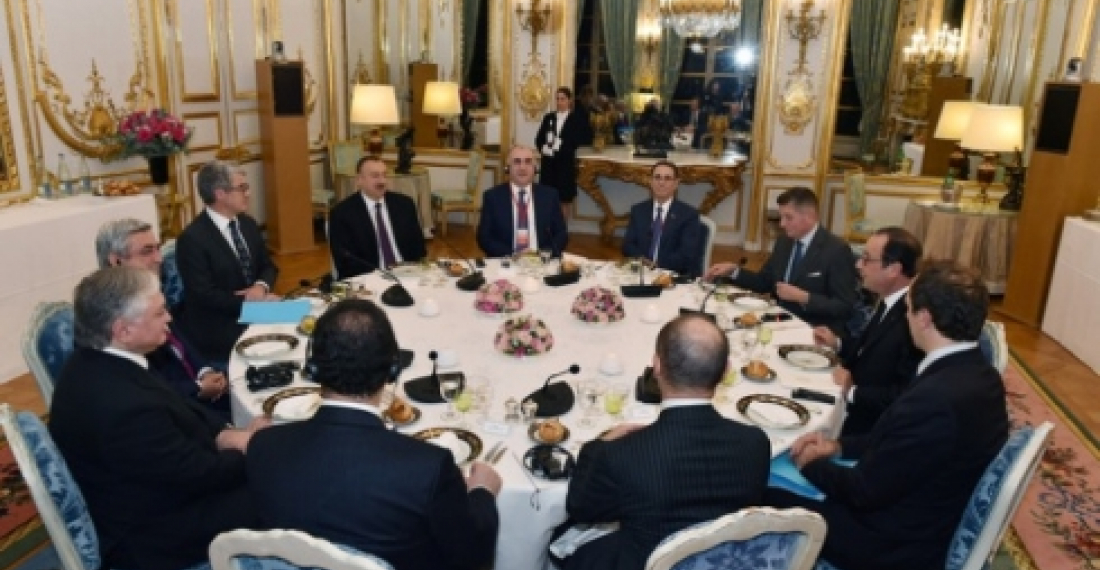This is a commentary prepared by the editorial team of commonspace.eu
For the third time in as many months, the Presidents of Armenia and Azerbaijan have met under the auspices of the international community to discuss the relations between them and the resolution of the Karabakh conflict. After an upsurge of violence in the summer the Presidents first met in Sochi, under the auspices of President Putin of Russia, and a month later in Wales, on the margins of the NATO Summit in a meeting hosted by United States Secretary of State John Kerry. This month it was the turn of President Hollande of France to host the two leaders in Paris for the third meeting. Russia, the United States and France are the three countries that co-chair the OSCE Minsk Process that is mandated to facilitate a resolution of the conflict between the two countries that has raged on for nearly a quarter of a century. All the three co-Chair countries have now hosted a high level meeting each in this latest round. Diplomatic nicities have been satisfied and boxes ticked. It is now time to get down to substance.
The first reactions from the two countries about the Paris talks have been overall positive, even if not particularly enthusiastic. Armenian Foreign Minister Edward Nalbandian characterised the meeting as "helpful, sincere and constructive". "I believe another small step was taken today towards drawing the positions of the parties nearer," Nalbandian was quoted as telling the press after the meeting. The Armenian Foreign Minister summed up the dilemma in which the negotiators and facilitators find themselves: Armenia wants to build confidence that would lead to a peace agreement; Azerbaijan wants a peace agreement from which confidence-building can be build. So we now know that the Karabakh conflict will be resolved once the two sides decide what comes first, the chicken or the egg. Foreign Minister Nalbandian also stated that the Paris meetings reaffirmed that the Minsk Process is the one and only framework for resolving the Nagorno-Karabakh conflict. The love-affair of Armenia with the Minsk Process rages on.
Azerbaijani Foreign Minister Elmar Mammadyarov also described the Paris meetings as "positive and contributing to the mutual understanding of positions". He has also embraced the chicken and egg debate, and not surprisingly his view on the matter is the complete opposite of his Armenian counterpart. Azerbaijan wants a peace agreement first, and confidence-building later. In essence Mammadyarov said that snipers will continue to operate on the line of contact until Armenia withdraws from the Azerbaijani territories around Nagorno-Karabakh that it occupied during the war in the 1990s.
So what is one to conclude from this latest piece of diplomatic theatre?
The Paris meetings, were useful, but they were not enough. None of the sides, and none of the international mediators have cause for any self-satisfaction. The problem is that nobody knows what else to do apart from bringing the sides together, giving them a good dinner and hoping for the best. The most interesting feature emerging from the meetings in Sochi, Wales and Paris is the lack of interest in them within Armenian and Azerbaijani societies. Those who have followed this process for many years remember the excitement that meetings between the two leaders used to generate. Not anymore. The diplomatic theatre it seems has lost its audience. Yet every month people die on the line of contact from violations of the cease fire arrangements. Hundreds of thousands of people remain caught in a situation of constant tension or suffering in and around the conflict zone. They do not have the luxury to ignore the efforts to resolve the conflict. Which is why the pressure must be kept on all concerned to move this peace process forward and close once and for all this terrible page in the history of the South Caucasus.
This commentary was prepared by the editorial team of commonspace.eu
Photo: President Hollande of France hosted a dinner for the presidents of Armenia and Azerbaijan at the Elysee Palace on 27 October 2014 following a day of talks aimed at unblocking the impasse in the negotiations on a peaceful resolution of the Nagorno-Karabakh conflict.







